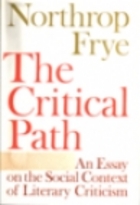
It’s interesting, Russell, that we’ve both said in separate posts this past week that the issues we are addressing come down to a matter of “emphasis.” For you, what needs to be emphasized is that Frye seems “to downplay the difficulty” of achieving what Gadamer characterizes as the “fusion of horizons” between literature and life. As you go on to observe, “What [Frye] calls anxieties may be the product of painful experience that cannot be readily cast aside.” Earlier in the week, meanwhile, I said in response to a post by you that what needs to be emphasized is the priority of literary over ideological meaning, of centripetal over centrifugal reference.
It seems therefore that the difference in emphasis really does account for the apparent divide between us. To my eyes, what you say about ideology, anxiety, and the potential for misrepresentation of a literary text in the classroom (The Taming of the Shrew once again standing duty on the issue) only does an end run around what Frye is trying to get us past. If we insist on the primacy of ideological anxiety, whatever its source, we only perpetuate that anxiety. This is what I mean when I say that all of our limitations when it comes to literature are self-imposed. As Joe illustrates very concretely in his post yesterday, the centripetal direction of literary meaning is the revelation of primary concern, and that is what literature is saying when it is otherwise saying nothing about what we ought, must, are obliged or compelled to believe as a matter of our prevailing ideological anxieties.
In The Educated Imagination Frye observes that the purpose of a “liberal education” centred around the study of literature is to liberate. We are, as Blake says, enchained by mind-forged manacles. The source of our freedom lies in the perception that we ourselves serve interchangably as master and slave, and no verbal context offers such a perception more comprehensivley than literature precisely because it is not ideological in reference, and because it is motivated by concern rather than compelled by anxiety.
You suggest that some “anxieties may be the product of painful experience that cannot be readily cast aside,” and that may very well be true, as far as it goes. But just because some anxieties cannot be readily cast aside does not mean that they cannot ultimately be cast aside. None of this is merely given to us. The human creative endeavor is fraught with our frailty and failings. But any notion of human “progress” has an implicit teleology, and in Frye’s case it is the revelation of primary concern, which is, like the gestalt of literal metaphor (the centripetal foundation of all verbal meaning), a universal condition that is individually experienced and expressed.
Apocalypse, says Blake, relates to the perceiver and not to the perceived. It is the distinction Frye makes in The Great Code between “panoramic” and “participating” apocalypse. Only the latter is a source of liberation, and that is up to each of us, one at a time, and at just about any time of our choosing. But first we have to become aware that it is available to us because we are the source of it, as evidenced by our ongoing acts of creation and recreation manifesting the emergence of primary concerns over ideological ones. And that, evidently, is the “intensified” state of consciousness Frye suggests in Words with Power is the aim of all critical endeavor. However, our consciousness cannot be so intensified if it stubbornly entangles itself in a state of ideological anxiety, which is as self-defeating as it is self-perpetuating.

